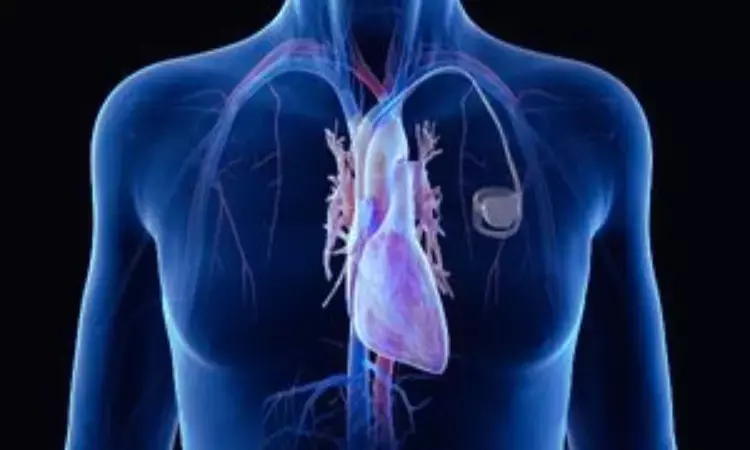- Home
- Medical news & Guidelines
- Anesthesiology
- Cardiology and CTVS
- Critical Care
- Dentistry
- Dermatology
- Diabetes and Endocrinology
- ENT
- Gastroenterology
- Medicine
- Nephrology
- Neurology
- Obstretics-Gynaecology
- Oncology
- Ophthalmology
- Orthopaedics
- Pediatrics-Neonatology
- Psychiatry
- Pulmonology
- Radiology
- Surgery
- Urology
- Laboratory Medicine
- Diet
- Nursing
- Paramedical
- Physiotherapy
- Health news
- Fact Check
- Bone Health Fact Check
- Brain Health Fact Check
- Cancer Related Fact Check
- Child Care Fact Check
- Dental and oral health fact check
- Diabetes and metabolic health fact check
- Diet and Nutrition Fact Check
- Eye and ENT Care Fact Check
- Fitness fact check
- Gut health fact check
- Heart health fact check
- Kidney health fact check
- Medical education fact check
- Men's health fact check
- Respiratory fact check
- Skin and hair care fact check
- Vaccine and Immunization fact check
- Women's health fact check
- AYUSH
- State News
- Andaman and Nicobar Islands
- Andhra Pradesh
- Arunachal Pradesh
- Assam
- Bihar
- Chandigarh
- Chattisgarh
- Dadra and Nagar Haveli
- Daman and Diu
- Delhi
- Goa
- Gujarat
- Haryana
- Himachal Pradesh
- Jammu & Kashmir
- Jharkhand
- Karnataka
- Kerala
- Ladakh
- Lakshadweep
- Madhya Pradesh
- Maharashtra
- Manipur
- Meghalaya
- Mizoram
- Nagaland
- Odisha
- Puducherry
- Punjab
- Rajasthan
- Sikkim
- Tamil Nadu
- Telangana
- Tripura
- Uttar Pradesh
- Uttrakhand
- West Bengal
- Medical Education
- Industry
Reconditioned pacemakers worked as well as new ones, finds study

A randomized trial that compared previously used and new pacemakers in patients found the reconditioned devices were as safe and effective as new pacemakers, potentially offering affordable options for patients in low-and middle-income countries.
This was the finding of late-breaking science presented today at the American Heart Association’s Scientific Sessions 2024. The meeting, Nov. 16-18, 2024, in Chicago, is a premier global exchange of the latest scientific advancements, research and evidence-based clinical practice updates in cardiovascular science.
Reusing pacemakers is prohibited in the U.S. However, the U.S. Food & Drug Administration allows re-sterilized devices to be exported for reuse. Pacemakers were recovered from deceased patients and patients undergoing surgeries that required the removal of their existing devices. Pacemakers with at least six years of battery life and proper electrical function were sterilized for reuse.
The “My Heart Your Heart” (MHYH) study compared the function of refurbished pacemakers to new devices in a randomized trial of nearly 300 adults in seven countries.
“Access to pacemakers is limited in many low- and middle-income countries due to the relatively high cost of the devices,” explained lead study author Thomas Crawford, M.D., a professor of internal medicine in the division of cardiovascular disease at the University of Michigan Medical School in Ann Arbor, Michigan. “In some high-income countries, as many as 1,000 people per million population may receive a pacemaker annually. In low-income countries, it could be 3 per million population or fewer who get pacemakers each year.”
Previous research has suggested that refurbished pacemakers could be safely implanted. However, those studies were retrospective, noting trends from previously collected information. This is the first prospective, randomized study that included patient outcomes related to function and infection with reconditioned devices, with follow-up information collected up to 90 days after implantation.
“With reconditioned pacemakers, there is worry about whether the device will cause infection and whether it will function properly,” Crawford said. “The 90-day endpoint of the My Heart Your Heart study addresses the most immediate concern of infection because most of the infections related to the implantation procedure occur within that period.”
The trial assessed outcomes in patients evaluated in the hospital at two weeks after pacemakers were implanted and for up to 90 days afterward.
The analysis found:
Five cases of infection at the implant site (device pocket infections) required implant removal: three of which were among the patients who had received new devices and two patients in the group that had received reconditioned pacemakers.
A superficial skin infection responsive to antibiotics occurred in one patient with a new device. This device did not have to be removed, and the infection cleared.
Five patients with new pacemakers required surgery to move or replace the device’s leads after pacemaker implantation, compared to six patients with reconditioned devices. Lead dislodgement is a known complication of a standard pacemaker implantation procedure.
No device malfunctions were reported among any patients.
Three deaths unrelated to the device implantation occurred in the reconditioned group and none in the new pacemaker group.
The researchers concluded that reconditioned pacemakers were comparable to new pacemakers in terms of safety and effectiveness up to 90 days after implantation; however, longer-term follow-up is necessary.
“Our study shows pacemaker recycling is green, good for the environment and can save the lives of people in other countries who can’t afford a new device,” Crawford said. “However, longer-term follow-up will be necessary to confirm the safety and efficacy of reconditioned devices, including whether they continue to work as expected and whether the batteries depreciate at the expected rate.”
Dr Kamal Kant Kohli-MBBS, DTCD- a chest specialist with more than 30 years of practice and a flair for writing clinical articles, Dr Kamal Kant Kohli joined Medical Dialogues as a Chief Editor of Medical News. Besides writing articles, as an editor, he proofreads and verifies all the medical content published on Medical Dialogues including those coming from journals, studies,medical conferences,guidelines etc. Email: drkohli@medicaldialogues.in. Contact no. 011-43720751


